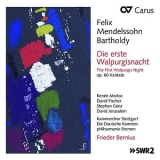 Felix Mendelssohn Bartholdy: Die Erste Walpurgisnacht op. 60 & Oedipus in Kolonos op. 93 (Auszüge); Renée Morloc (Alt), David Fischer (Tenor), Stephan Genz (Bariton), David Jerusalem (Bass), Kammerchor Stuttgart, Die Deutsche Kammerphilharmonie Bremen, Klassische Philharmonie Stuttgart, Frieder Bernius (Leitung); 1 CD Carus Nr. 83.503; Aufnahme 09/2004 & 04/2019, Veröffentlichung 03/04/2020 (47‘19) – Rezension von Jan-Geert Wolff
Felix Mendelssohn Bartholdy: Die Erste Walpurgisnacht op. 60 & Oedipus in Kolonos op. 93 (Auszüge); Renée Morloc (Alt), David Fischer (Tenor), Stephan Genz (Bariton), David Jerusalem (Bass), Kammerchor Stuttgart, Die Deutsche Kammerphilharmonie Bremen, Klassische Philharmonie Stuttgart, Frieder Bernius (Leitung); 1 CD Carus Nr. 83.503; Aufnahme 09/2004 & 04/2019, Veröffentlichung 03/04/2020 (47‘19) – Rezension von Jan-Geert Wolff

Alle früheren Einspielungen der Kantate Die Erste Walpurgisnacht von Felix Mendelssohn Bartholdy kombinieren das nicht allzu lange Werk mit anderen Stücken oder verstehen es als klingenden Appendix im Schatten des Bekannteren. Carus stellt Opus 60 mit dieser Aufnahme in den Mittelpunkt und ergänzt es durch Auszüge von Mendelssohn Bartholdys Schauspielmusik Oedipus in Kolonos. Letzteres nahm Frieder Bernius mit den Männerstimmen des Kammerchors Stuttgart und der Klassischen Philharmonie Stuttgart bereits 2004 auf und veröffentlichte es bei Carus 2009 sowie 2014 mit weiteren Schauspielmusiken Mendelssohns. Für die vorliegende Einspielung der Walpurgisnacht dienen diese drei Tracks also eher als Trailer für die im Booklet beworbene Gesamtaufnahme, weswegen sich das Augenmerk dieser Besprechung auf Opus 60 konzentrieren kann.
Schon mit den ersten Takten weiß man, woran man ist: Pulsierend lässt Bernius die Musiker der fein austariert agierenden Kammerphilharmonie Bremen voranstürmen, nutzt kleine dynamische Pausen zu neuem Schwung, die Spannung bleibt dabei ungebrochen. Das Tempo ist gewagt, in den Streichern geraten die Läufe zuweilen leicht verhuscht. Die erste Ouvertüre heißt „Das schlechte Wetter“ – doch statt dunkler Bewölkung herrscht hier Transparenz, vor allem die Holz- und Blechbläser spielen delikat. Attacca geht es über in die Ouvertüre II: Der darzustellende Frühling gerät licht und süß, weiterhin energiegeladen und einnehmend – Markenzeichen der ganzen Aufnahme.
Mendelssohn hat in seiner Kantate Verse Goethes vertont: Es geht um alte Bräuche, die das Christentum zu unterbinden versucht, doch das Volk will im Harzgebirge den Frühling nach heidnischem Brauch begrüßen. Das Spiel mit Licht und Schatten gelingt auch den Interpreten: Der Kammerchor Stuttgart stellt mutige Aufsässige dar, seine Diktion ist stets durchhörbar und akzentuiert; die Solisten – Renée Morloc (Alt), David Fischer (Tenor), Stephan Genz (Bariton) und David Jerusalem (Bass) – gestalten ihre Rollen packend, das Orchester gibt die farbenfrohe Kulisse reich an Kontur. Die Dialoge zwischen den Solisten und dem Tutti sind stets von prickelnder Spannung erfüllt.
Die Erste Walpurgisnacht ist eine weltliche Kantate und gehört nicht zu den Schauspielmusiken (wie Oedipus in Kolonos); hier jedoch wird die Musik selbst zum Schauspiel, der Kammer- wird zum Opernchor: ein wunderbares ‘Rundgeheule’ also, wie es in einem Chor heißt. Und Frieder Bernius erweist sich einmal mehr als überzeugter und glutvoller Romantiker mit besonderem Faible für die Musik Felix Mendelssohn Bartholdys.
All earlier recordings of the cantata Die Erste Walpurgisnacht by Felix Mendelssohn Bartholdy combine the not-too-long work with other pieces or understand it as an appendix in the shadow of more familiar music. With this recording, Carus focuses on Opus 60 and supplements it with excerpts from Mendelssohn Bartholdy’s incidental music Oedipus in Kolonos. Frieder Bernius recorded the latter with the male voices of the Kammerchor Stuttgart and the Klassische Philharmonie Stuttgart back in 2004 and published it with Carus in 2009 and with further incidental music by Mendelssohn in 2014. For the present recording of Walpurgis Night, these three tracks thus serve more as a trailer for the complete recording advertised in the booklet, which is why we can focus on Opus 60.Bernius lets the musicians of the finely balanced Kammerphilharmonie Bremen rush forward, using small dynamic pauses to create new momentum, while the tension remains unbroken. The tempo is daring, and the strings are at times slightly hushed up in the runs. The first overture is called The Bad Weather – but instead of dark clouds there is transparency; especially the woodwinds and brass play delicately. The music moves on attacca to Overture II: the depicted spring is light and sweet, still energetic and engaging – the trademark of the whole recording.Mendelssohn set verses by Goethe to music in his cantata: it is about old customs that Christianity tries to stop, but the people in the Harz Mountains want to welcome spring according to pagan custom.The interpreters also succeed in playing with light and shadow: The Kammerchor Stuttgart portrays courageous rebels, its phrasing is always clear and well accentuated; the soloists – Renée Morloc (alto), David Fischer (tenor), Stephan Genz (baritone) and David Jerusalem (bass) – convince with gripping interpretations, the orchestra provides the colourful backdrop rich in contour. The dialogues between the soloists and the tutti are always filled with sparkling tension.The First Walpurgis Night is a secular cantata and does not belong to the music for a drama (like Oedipus in Kolonos); here, however, the music itself becomes a drama, the chamber choir becomes kind of an opera choir. And Frieder Bernius proves himself once again to be a convinced and fervent romantic with special sills for Mendelssohn’s music.
























